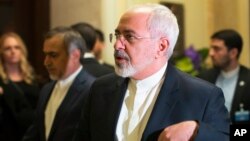The U.S. State Department says Israeli Prime Minister Benjamin Netanyahu's reelection will have no impact on nuclear talks with Iran.
Spokeswoman Jen Psaki said Wednesday the U.S. has long been familiar with Netanyahu's opposition to a possible deal with Iran. She again said that meetings with Iran have been "difficult but constructive." However, she said the talks on the technical side have been "professional and fruitful" in clarifying and sharpening the issues.
Two weeks before the Israeli election, Netanyahu angered the Obama administration by addressing the U.S. Congress and calling the still-pending deal with Iran a "bad deal."
In Lausanne, Switzerland - site of the current round of nuclear talks - Iranian Foreign Minister Mohammad Javad Zarif said Wednesday that Friday's planned meeting with the other foreign ministers involved in the negotiations is unlikely. Zarif told Iranian television that everyone says the political will for a settlement exists, but it is still to be seen if it is really there.
The foreign ministers would join the negotiations when it looks like a deal is close.
Iran and the so-called P5 + 1 (Britain, China, France, Germany, Russia and the United States) face a March 31 deadline for a framework agreement.
Iran would scale back its uranium enrichment program to prevent it from being able to build a nuclear bomb. The U.S. and its partners would ease sanctions that have devastated the Iranian economy.
Opponents to a deal, including Netanyahu and a number of U.S. lawmakers, say it gives too many concessions to Iran and leaves it room to still develop a bomb.
Iran consistently denies wanting to build atomic weapons, saying its nuclear program is strictly for peaceful civilian uses.





